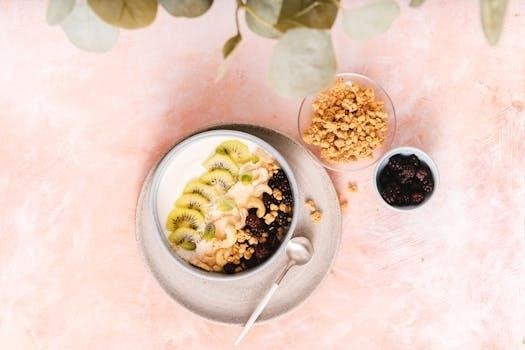What is an Alkaline Diet?
An alkaline diet emphasizes consuming foods that are considered alkaline-forming, such as fruits, vegetables, and legumes. The goal is to balance the body’s pH levels, potentially preventing certain illnesses and promoting overall wellness. The diet typically involves a high intake of plant-based foods.
Understanding the Basics of Alkaline Eating
Alkaline eating centers around the idea that certain foods can influence the body’s pH balance. The diet categorizes foods as either alkaline, neutral, or acidic. The primary focus is on consuming a higher proportion of alkaline-forming foods, which include a wide variety of fruits, vegetables, nuts, seeds, and legumes. It suggests that 60% of your daily food intake should come from alkaline sources. This approach aims to promote overall health by preventing the body from becoming too acidic. The diet often suggests reducing the consumption of acidic foods, such as processed foods, sugary treats, and fatty meats. Many believe this diet can help to combat inflammation and promote weight loss.

Benefits of a 7-Day Alkaline Meal Plan
A 7-day alkaline meal plan may lead to improved health and vitality. Benefits include potential weight loss, reduced inflammation, and increased overall well-being. It may also promote a more balanced body pH.
Potential Health Improvements and Weight Loss
Following a 7-day alkaline meal plan can offer several potential health benefits. Many individuals report feeling more comfortable and content, experiencing increased confidence and overall well-being. The focus on nutrient-dense, alkaline-forming foods may contribute to weight loss. Additionally, the diet’s emphasis on plant-based options can promote better digestion and reduce inflammation. By incorporating alkaline foods into your daily routine, you might experience an improvement in your body’s pH balance and enhanced vitality. Remember that individual results can vary.
Foods to Include in Your Alkaline Meal Plan
Focus on alkaline-forming foods like fruits, vegetables, legumes, nuts, and seeds. Olive oil, coconut oil, and flaxseed oil are also beneficial. These foods help promote a balanced pH and overall health.
Alkaline-Forming Foods⁚ Fruits, Vegetables, Legumes, etc.
An alkaline diet highlights the importance of incorporating a variety of alkaline-forming foods. These include an abundance of fresh fruits like apples and apricots, alongside a wide array of vegetables such as asparagus, broccoli, and beetroot. Legumes like peas and beans, as well as soy products like tofu, also play a vital role. Nuts and seeds, and healthy oils like olive, coconut, and flaxseed are also included. These foods work together to help maintain a balanced pH level within the body, supporting overall well-being and vitality.
Foods to Avoid on an Alkaline Diet
On an alkaline diet, it is essential to limit acidic foods. This includes sugary treats, fatty meats, and dairy products. These foods can disrupt the body’s pH balance, so they should be consumed in moderation or avoided.
Acidic Foods and Their Impact on pH Levels
Acidic foods, such as processed foods, sugary drinks, and excessive amounts of meat and dairy, can potentially disrupt the body’s delicate pH balance. Consuming these foods can lead to a more acidic environment within the body. This shift in pH can contribute to inflammation and various health issues over time. The alkaline diet aims to counteract these effects by emphasizing alkaline-forming foods, thus promoting a more balanced internal environment. Limiting acidic intake is key to maintaining optimal pH levels and overall well-being, according to the principles of this diet.
Sample 7-Day Alkaline Meal Plan Structure
A typical 7-day alkaline meal plan includes three meals and two snacks daily. These meals are structured to incorporate a variety of alkaline-rich foods, ensuring a balanced and nutritious approach to eating. It is recommended to plan the menu for the week ahead.
Daily Meals and Snacks for a Balanced Approach
A balanced approach to a 7-day alkaline meal plan involves carefully chosen daily meals and snacks. Breakfasts might include options like chia seed pudding or quinoa with fruit. Lunches could feature savory salads or vegetable-based dishes. Dinners can incorporate roasted vegetables, stews, and other alkaline-forming foods. Snacks, such as nuts, seeds, and fruits, help maintain energy levels and offer essential nutrients. This structure ensures a diverse intake of alkaline foods throughout the day, promoting a well-rounded dietary plan focused on pH balance and overall health.

Alkaline Diet Recipes for Beginners
Easy alkaline recipes are essential for beginners. These recipes often include simple dishes for breakfast, lunch, and dinner, featuring alkaline ingredients. Many recipes are designed to be quick, delicious, and immune-boosting.
Easy and Delicious Options for All Meals
For beginners, the alkaline diet can be made enjoyable with a variety of easy and delicious meal options. These recipes often incorporate simple, nutrient-dense ingredients, ensuring that each meal is both satisfying and beneficial. Breakfast choices might include chia seed pudding or quinoa with fruit. Lunch could feature a savory salad with mixed greens and nuts. Dinner options may include roasted vegetables, tofu, or light stews. Such variety makes it easy to follow the plan while enjoying the process of eating healthy and delicious food. These recipes are designed to make the diet manageable and enjoyable.
Importance of Meal Prep for Alkaline Diet
Meal preparation is crucial for successfully following an alkaline diet. Planning ahead ensures that you have alkaline-friendly meals and snacks readily available, making it easier to avoid non-compliant foods and maintain consistency with your plan.
Tips and Techniques for Organized Meal Planning
To effectively meal prep for an alkaline diet, start by planning your meals for the entire week using a 7-day alkaline meal plan PDF as your guide. Create a detailed shopping list based on your chosen recipes. Allocate time each week to prepare ingredients like chopping vegetables, cooking grains, and making dressings. Store prepped ingredients in airtight containers in the refrigerator for easy access. Pre-portion meals into individual containers for grab-and-go convenience. Consider preparing larger batches of recipes to save time. This structured approach promotes healthy eating habits.
Alkaline Diet Meal Plan PDF Resources
Many websites offer free downloadable 7-day alkaline meal plan PDFs. These resources often include recipes, food lists, and shopping guides, making it easier to start and maintain the diet.
Where to Find Downloadable Plans and Guides
Numerous websites provide free, downloadable PDF resources for 7-day alkaline meal plans. These guides often include detailed meal plans, shopping lists, and alkaline recipes. Look for options that cater to beginners, with clear instructions and easy-to-follow recipes. Many sources also offer additional materials like meal prep guides and information on the principles of the alkaline diet. These PDF resources are a convenient way to start your alkaline journey, ensuring you have all the necessary information at your fingertips; Some plans may even include tips for weight loss and managing inflammation.

Alkaline Diet and Inflammation
An alkaline diet may help reduce inflammation in the body by focusing on anti-inflammatory foods. By cutting back on certain items, the body can heal naturally. This can positively impact overall health.
How the Diet Helps Reduce Inflammation
The alkaline diet helps reduce inflammation by emphasizing foods that are naturally anti-inflammatory, such as fruits, vegetables, and legumes. These foods are rich in antioxidants and phytonutrients, which combat free radicals and reduce oxidative stress, a key contributor to inflammation. By limiting acidic foods like processed meats and sugary treats, the diet further minimizes inflammatory responses in the body. This focus on whole, plant-based foods can lead to a reduction in chronic inflammation, supporting overall health and well-being. Following a 7-day alkaline meal plan may help kickstart this process.

Alkaline Diet and Body pH Balance
The alkaline diet aims to balance the body’s pH levels by consuming more alkaline foods. This approach suggests that reducing acidity may help prevent certain illnesses and improve overall health by promoting better pH.
Understanding the Science Behind pH Levels
The concept of pH balance is crucial to the alkaline diet. pH is a measure of how acidic or alkaline a substance is, with a scale ranging from 0 to 14. A pH of 7 is neutral, below 7 is acidic, and above 7 is alkaline. The alkaline diet posits that consuming more alkaline-forming foods can help maintain a balanced pH in the body. This balance is believed to influence various bodily functions, and proponents of the diet suggest that it can help improve overall health by reducing acidity.
Alkaline Diet for Weight Loss
The alkaline diet can support weight loss by emphasizing nutrient-dense, low-calorie foods like fruits and vegetables. These foods promote satiety, potentially reducing overall calorie intake and aiding in weight management.
How the Diet Can Aid in Weight Management
The alkaline diet, rich in plant-based foods, naturally supports weight loss due to its high fiber content and low caloric density. These alkaline-forming foods, such as fruits, vegetables, and legumes, promote a feeling of fullness, which can help reduce overeating. Additionally, the diet’s focus on whole, unprocessed foods minimizes the intake of unhealthy fats and sugars, contributing to a healthier body weight. By emphasizing nutrient-rich options and reducing processed foods, this approach can be a beneficial strategy for weight management and overall well-being.

